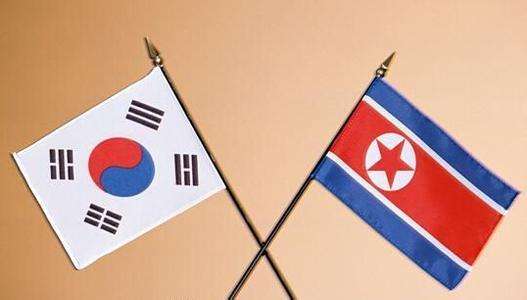In Korea, there must be no turning back!
- By Earl Bousquet
 0 Comment(s)
0 Comment(s) Print
Print E-mail China.org.cn, January 14, 2018
E-mail China.org.cn, January 14, 2018

National flags of South Korea (L) and the Democratic People's Republic of Korea (DPRK)
New Year developments on the Korean Peninsula provide a spark of light in the dark that must not be allowed to go out.
The offer of the Democratic People's Republic of Korea (DPRK) President Kim Jong-un to talk to South Korea about participating in the upcoming Winter Olympics and Paralympics across the border in Pyeongchang, and the positive response by his South Korean counterpart, President Moon Jae-in, have provided prospects eventually for a much-needed lowering of peninsula tensions.
South Korea's warm embrace of the offer and its invitation to the DPRK to widen the talks to include other peace possibilities, taken alongside the reopening of the inter-Korean communications hotline (silent since the previous South Korean administration unilaterally closed down the Kaesong inter-Korean industrial zone in the DPRK border town in February 2016 following the north's fourth nuclear test a month earlier) are equally positive developments.
Just as welcome are the dispatch of China's Vice Foreign Minister and Special Representative on Korean Peninsula Affairs Kong Xuanyou to Seoul for talks with his South Korean counterpart Special Representative on Korean Peace and Security Affairs Lee Do-hoon.
In addition, bilateral discussions have been held between South Korea's Foreign Minister Kang Kyung-wha and U.S. Secretary of State Rex Tillerson on the possibilities of a diplomatic solution to the worrying conflict created by the DPRK's ambitions to develop a full-fledged nuclear arsenal.
Equally refreshing is the eventual acceptance by U.S. President Donald Trump of a request by President Moon to suspend the joint U.S.-led war games during the Olympics .
None of these developments were expected on the last day of 2017; and all became possible because the leaders of North and South Korea agreed to seize the moment stemming from the DPRK president's New Year address.
China's invitation to the international community to make positive use of the new situation must not be overlooked or underestimated.
No side has anything to gain from any type of military solution to the peninsula's tensions, which has for too long left the rest of the region – and the wider world – worrying about the potential cost of a nuclear conflagration.
The use of threats and bellicose language has not helped, nor has the ridiculous claim that China has been engaging in sanction-busting in the DPRK's interest.
China has absolutely nothing to gain from a collapsed DPRK on its border, or a military confrontation that can start with or include a nuclear first-strike by any side. Nor does South Korea or Japan – and neither does the U.S., never mind the illogical comparison of which side's "nuclear button" is bigger or better.
The simply horrible fact is that a nuclear first-strike by any side, by today' standards, will result in unimaginable death and destruction that will affect more than just the Korean Peninsula or the U.S. mainland. The entire world would undoubtedly be affected, possibly resulting in World War III.
All sides directly involved in the conflict have finally demonstrated – at least for now – that they not only understand the enormity of situation, but that they are also willing to give peace a chance.
Initial derision of the DPRK's offer of a proverbial olive branch to South Korea has been replaced by what amounts to a demonstration of a will and ability to step back from the brink.
It must be hoped that this is not just a temporary exhibition of maturity, but a realization that it is always better to avoid any possibility of causing monumental loss of innocent lives.
Both North and South Korea have paid the heaviest prices for failure to put peace before war. The ultimate cost lingers in the minds of living victims of the earlier war in Korea. For the moment, bluster has been replaced with confidence-boosting talk and action and the whole world is breathing a collective sigh of relief.
It is now for all sides – those directly involved and those to be directly affected – to stay the current course by ensuring the much-welcomed conciliatory words and actions lead to real and enduring commitments and agreements that take the cause of world peace into full consideration.
In this task, it is incumbent on the world to not only encourage dialogue between the regional stakeholders, but to also actively contribute to ensuring that the main players understand that this is not a game between them, but a real threat to world peace that must be eliminated once and for all.
It will not be at all easy to get all sides to step back from the brink of catastrophe, but the alternative is too horrible to contemplate.
The longest voyage starts with the first step. The first few have been taken along the long road to ultimate peace in the Korean Peninsula. But more will definitely be needed, and there can be no turning back!
Earl Bousquet is a contributor to china.org.cn, editor-at-large of The Diplomatic Courier and author of an online regional newspaper column entitled Chronicles of a Chronic Caribbean Chronicler.
Opinion articles reflect the views of their authors, not necessarily those of China.org.cn.






Go to Forum >>0 Comment(s)